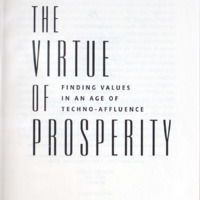-
Title
-
The virtue of prosperity : finding values in an age of techno-affluence
-
Description
-
Discusses the potential problems of technological advancement in America, such as class conflict and transformation of the human race due to life-span lengthening and parents' choosing children's genetic makeups, and proposes ways of using technology to promote overall prosperity while preserving values.
-
Identifier
-
896706
-
684868148
-
Creator
-
D'Souza, Dinesh
-
Source
-
Brian Lamb Booknotes Collection
-
Gift of Brian Lamb, 2011.
-
Catalog record
-
Language
-
eng
-
Date
-
2000
-
Program air date: January 14, 2001
-
Publisher
-
Free Press
-
George Mason University. Libraries. Special Collections & Archives
-
Text
-
Transcription of Annotations
Notes on front endpapers: "Dec. 4, Mon, 2:30 p.m. - Dinesh came to U.S. [in]1978, exchange student, Dartmouth, 5 year old daughter, teaching her chess, grew up [in] outskirts of Bombay; 'I play [?] at chess in S.F., $2'. Rancho Santa Fe : lives in; women don't walk in our neighborhood; Party of Nah: the cultivation of good is central to the good life, p. 172; Party of Yeah: hero is Mandeville, p. 177, greed is necessary; America is the best society that now exists or has ever existed, p. 187. - George Gilder, p. 30: religious war, act of faith, creative society. - Bernard Mandeville, struggle for existence is over, greed, capitalism - right vs. left, genetic engineering; Adam Smith, John Lake, Francis Bacon, David Hobbes, Kevin Kelly vs. Kirkpatrick Sale, Wendell Berry. - 'Greater wealth doesn't create greater happiness' - Richard Easterlin." -- Notes on back endpapers: "James Watson vs. Jeremy Rifkin; Leon Kass - Party of Nah - vs. Richard Dawkins - Party of Yeah: Techno-Nietzschean. - Gemeinschaft to Gesellschaft - society moves. - I have no problem with anti-aging drugs - the cloning issue. - Materialism - ideology of best minds in Party of Yeah. - Aristotle, p. 229; Shakespeare, p. 208; Bernard Strehler, p. 188; Samuel Johnson, p. 161; John Adams, p. 135; Montesquieu, p. 110; Friedrich Hayek, p. 84; The Federalist Papers, p. 62; Tocqueville, p. 28; Thomas Paine, p. 1; Yogi Berra, p. xi; Milton. - In memory of Allan D'Souza, 1933-2006." -- Annotations by Brian Lamb in the margins and underlining of pertinent phrases throughout the book. Examples: p. 6, underlined: "Now we know that capitalism is the only economic system that works and markets are the acknowledged arbiters of production and value". - p. 12: "If Bill [Gates] were a country, he would be number thirty-five in the world rankings". - p. 42: "...So thirty people in this country have a net worth that exceeds the collective annual earnings of black America". - p. 228: "In a universe of physical forces and genetic replication, some people are going to get hurt, other people are going to get lucky, and you won't find any rhyme or reason in it, nor any justice". - p. 245: "By reading good books, by taking them seriously as advancing claims about the good life, we can let the great thoughts of the ancient world speak to us and transform us from within." - p. 252: "Parents who try to design their children are in some ways more tyrannical than slave owners, who merely sought to steal the labor of their slaves."
-
Subject
-
"Wealth--Moral and ethical aspects--United States."
-
"Success--Moral and ethical aspects--United States."
-
"Values--United States."
-
Relation
-
Original Booknotes interview
-
Rights
-
This work may be protected by copyright laws and is provided for educational and research purposes only. Any infringing use may be subject to disciplinary action and/or civil or criminal liability as provided by law. If you believe that you are the rights-holder and object to Mason’s use of this image, please contact speccoll@gmu.edu.
 896706.pdf
896706.pdf